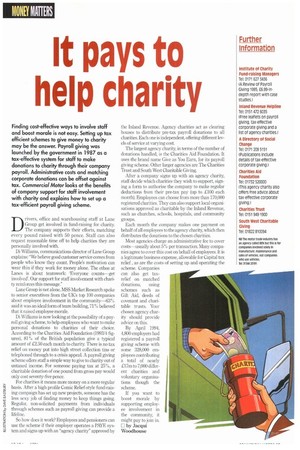It pays to help charity
Page 51

If you've noticed an error in this article please click here to report it so we can fix it.
Finding cost-effective ways to involve staff and boost morale is not easy. Setting up tax efficient schemes to give money to charity may be the answer. Payroll giving was launched by the government in 1987 as a tax-effective system for staff to make donations to charily through their company payroll. Administrative costs and matching corporate donations can be offset against tax. Commercial Motor looks at the benefits of company support for staff involvement with charily and explains how to set up a tax-efficient payroll giving scheme.
Drivers, office and warehousing staff at Lane Group get involved in fund-raising for charity. The company supports their efforts, matching every pound raised with 50 pence. Staff can also request reasonable time off to help charities they are personally involved with.
Di Williams, communications director of Lane Group explains: "We believe good customer service comes from people who know they count. People's motivation can wear thin if they work for money alone. The ethos at Lanes is about teamwork: 'Everyone counts—get involved'. Our support for staff involvement with charity reinforces this message."
Lane Group is not alone. MSS Market Research spoke to senior executives from the UK's top 100 companies about employee involvement in the community-63% said it was an ideal form of team building, 71% believed that it raised employee morale.
Di Williams is now looking at the possibility of a payroll giving scheme, to help employees who want to make personal donations to charities of their choice. According to the Charities Aid Foundation (1993/4 figures). 81 1),/. of the British population give a typical amount of £2.50 each month to charity. There is no tax relief on money put into high street collection tins or telephoned through to a crisis appeal. A payroll giving scheme offers staff a simple way to give to charity out of untaxed income. For someone paying tax at 25%, a charitable donation of one pound from gross pay would only cost seventy-five pence.
For charities it means more money on a more regular basis. After a high profile Comic Relief-style fund-raising campaign has set up new projects, someone has the less sexy job of finding money to keep things going. Regular. non-solicited payments from individuals through schemes such as payroll giving can provide a lifeline.
So how does it work? Employees and pensioners can use the scheme if their employer operates a PAYE system and signs up with an "agency charity" approved by the Inland Revenue. Agency charities act as clearing houses to distribute pre-tax payroll donations to all charities. Each one is independent, offering different levels of service at varying cost.
The largest agency charity, in terms of the number of donations handled, is the Charities Aid Foundation. It uses the brand name Give as You Earn, for its payroll giving scheme. Other larger agencies are The Charities Trust and South West Charitable Giving.
After a company signs up with an agency charity; staff decide which charities they wish to support, signing a form to authorise the company to make regular deductions from their pre-tax pay (up to £100 each month). Employees can choose from more than 170,000 registered charities. They can also support local organisations approved as charitable by the Inland Revenue, such as churches, schools, hospitals, and community groups.
Each month the company makes one payment on behalf of all employees to the agency charity, which then distributes the donations to the chosen charities.
Most agencies charge an administrative fee to cover costs—usually about 5% per transaction. Many companies agree to cover this cost on behalf of employees. It is a legitimate business expense, allowable for Capital tax relief, as are the costs of setting up and operating the scheme. Companies can also get taxrelief on matched donations, using schemes such as Gift Aid, deeds of covenant and charitable trusts. Your chosen agency charity should provide advice on this.
By April 1994, 4,800 employers had registered a payroll giving scheme with some 328,000 employees contributing a total of nearly £17m to 7,000 different charities and voluntary organisations though the scheme.
If you want to boost morale by supporting employee involvement in the community, it might pay to join in. E by Jacqui Woodhouse
Further Information
Institute of Charity Fund•raising Managers Tel: 0171 627 3436 (A Review of Payroll Giving 1995, £6.99-indepth report with case studies.) Inland Revenue Helpline Tel: 0151 472 6035 (Free leaflets on payroll giving, tax-effective corporate giving and a list of agency charities.) A Directory of Social Change Tel: 0171 209 5151 (Publications include details of tax-effective corporate giving) Charities Aid Foundation Tel: 01732 520000 (This agency charity also offers free advice about tax-effective corporate giving) Charities Trust Tel: 0151 949 1900 South West Charitable Giving
Tel: 01822 810094
NS The motor trade industry has an agency called BEN but this is for companies involved solely in manufacture, maintenance and sales of vehicles, not companies who use vehicles.
TeL 01344 20191






























































































































